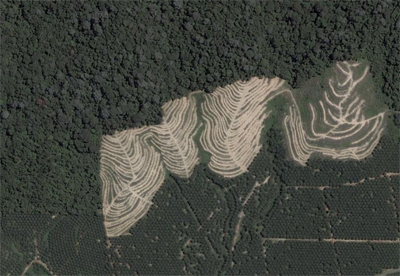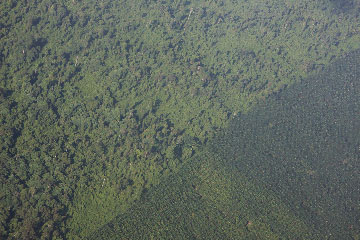Palm oil industry relies on greenwashing to mislead consumers, alleges report
mongabay.com
October 8, 2008
|
|
The Malaysian palm oil industry is relying on marketing tactics that mislead the public about its environmental performance rather than taking effective steps to become “greener” alleges a new report from the environmental group Friends of the Earth (FOE).
“Malaysian Palm Oil: Green Gold or Green Wash?” [PDF] says that the Malaysian Palm Oil Council (MPOC), an industry body, is putting considerable effort into advertising Malaysian palm oil as an eco-friendly alternative to fossil fuels and other oilseeds, while glossing over the negative impacts of the crop, including greenhouse gas emissions, deforestation, pollution, and social injustices. The report calls upon the Malaysian government — in particular the Sarawak state government — to address false claims by the industry and implement policies that “honor the rights and wishes of Sarawak’s indigenous peoples and the need for a better protection of the environment.”
“With this report, Friends of the Earth groups from Malaysia and Europe are confronting the misleading claims of the Malaysian
palm oil lobby and informing decision makers about the serious sustainability challenges the sector faces on the ground,” states the report, which cites a number of examples of what it considers misleading claims by the palm oil industry. “This Friends of the Earth report challenges MPOC’s ‘green’ claims, so as to prevent decision makers, including consumers, from being misled. Under present conditions, an acceptance of Malaysia’s palm oil claims will legitimize further tropical deforestation, human rights violations against indigenous peoples and suppression of public participation in government
decision making. All that could happen — and has happened — under the banner of ‘sustainable palm oil’ and ‘green energy’.”
 Oil palm plantation expansion at the expense of natural forest in the Malaysian state of Johor. Image courtesy of NASA’s Earth Observatory / Google Earth. |
The report highlights the proliferation of pro-palm oil web sites — which FOE says are underwritten by MPOC — as well as the appearance of dubious environmental NGOs supporting oil palm expansion; the use of blogs and comment spam to attack critics of palm oil; and the release of marketing videos and editorials that make questionable claims about the ecological impact of oil palm plantations. One video even uses iguana and hummingbirds — species found nowhere near Malaysia — to suggest that biodiversity thrives in plantations when a mountain of scientific studies show that oil palm estates are biologically impoverished compared even with heavily logged forests.
“The generic claim of the Malaysian palm oil lobby that ‘Malaysian palm oil is sustainable’ is false and potentially misleading,” states the report, which then lays out a series of recommendations to improve the sustainability of the palm oil sector in Malaysia, including strict enforcement of ‘no burn’ policies for land management, establishing better protections for indigenous communities, implementing a ban on natural forest conversion for oil palm plantations, engaging in meaningful dialog between stakeholders, and facilitating public participation in Environmental Impact Assessments prior to the approval and commencing of new estates. FOE says that palm oil customers — including Western companies that buy palm oil — and investors in plantation companies should pressure producers to improve the sustainability of the industry.
 Oil palm plantations near Lahad Datu, Malaysia. Photo by Rhett A. Butler |
For their part, some oil palm producers are working to reduce the environmental impact of existing estates by curtailing use of pesticides and fertilizers; capturing palm oil mill effluent before it goes enters streams and creeks; cutting burning of plantation waste; and maintaining and even expanding forest corridors along waterways to create connectivity between forest fragments and reduce erosion. Efforts to boost palm oil yields through selective-breeding programs further offer the potential increase net production without the need to expand the area under cultivation. Finally because oil palm is the highest-yielding mass market oilseed, responsible palm oil production offers more vegetable oil per unit of area than other widely-grown crops including soy, canola, or rapeseed. Thus oil palm expansion on abandoned agricultural lands could offer producers a more effective way to sustainably meet growing demand for vegetable oils than with other oilseeds.
Full report | Executive summary
Related articles
Falling palm oil price makes palm biodiesel viable, may offer target for NGOs
(9/10/2008) Plunging palm oil prices are increasing its attractiveness as a biofuel feedstock and thereby helping buoy demand for the oilseed, reports Reuters.
Palm oil industry moves into the Amazon rainforest
(7/9/2008) Malaysia’s Land Development Authority FELDA has announced plans to immediately establish 100,000 hectares (250,000) of oil palm plantations in the Brazilian Amazon. The agency will partner with Braspalma, a local company, to form Felda Global Ventures Brazil Sdn Bhd. FELDA will have a 70 percent stake in the venture. The announcement had been expected. Last month Najib said Malaysia would seek to expand its booming palm oil industry overseas. The country is facing land constraints at home.
Sustainability conference reveals a rift in the Malaysian Palm Oil Council May 1, 2008
Last month’s sustainability conference sponsored by the Malaysian Palm Oil Council (MPOC) revealed a rift between some planters and the industry marketing organization. Speaking on the condition of anonymity, several oil palm plantation executives distanced themselves from a video created by the MPOC as well as closing remarks by the group’s CEO, Tan Sri Datuk Dr. Yusof Basiron. They said the video and comments provided ammunition for NGOs that accuse the MPOC of greenwashing.
Malaysian palm oil industry puts sustainability in the spotlight April 17, 2008
Seeking to differentiate its palm oil from that produced less responsibly in other countries, the Malaysian Palm Oil Council (MPOC) sponsored a three-day meeting this week in Kota Kinabalu, on the island of Borneo. The International Palm Oil Sustainability Conference (IPOSC) aimed to promote the virtues of palm oil and address environmental concerns that many green groups say plague the industry.
Palm oil industry prepares green initiative to counter criticism
(1/18/2008) Global food and consumer goods giants are backing a plan to certify that palm oil is produced in a way that doesn’t drive destruction of tropical rainforests, reports The Wall Street Journal. The move comes as the palm industry is facing increasing scrutiny — and consumer backlash — for its practices which scientists say are driving large-scale destruction of forests across Indonesia and Malaysia, resulting in massive greenhouse gas emissions.
Eco-friendly palm oil could help alleviate poverty in Indonesia – Palm oil is not a failure as a biofuel
(April 4, 2007) The Associated Press (AP) recently quoted Marcel Silvius, a renowned climate expert at Wetlands International in the Netherlands, as saying palm oil is a failure as a biofuel. This would be a misleading statement and one that doesn’t help efforts to devise a workable solution to the multitude of issues surrounding the use of palm oil.
Palm oil doesn’t have to be bad for the environment
(April 4, 2007)
As traditionally practiced in Southeast Asia, oil-palm cultivation is responsible for widespread deforestation that reduces biodiversity, degrades important ecological services, worsens climate change, and traps workers in inequitable conditions sometimes analogous to slavery. This doesn’t have to be the case. Following examples set forth by the Roundtable on Sustainable Palm Oil and firms like Golden Hope Plantations Berhad, a Malaysian palm-oil producer, oil palm can be cultivated in a manner that helps mitigate climate change, preserves biodiversity, and brings economic opportunities to desperately poor rural populations.